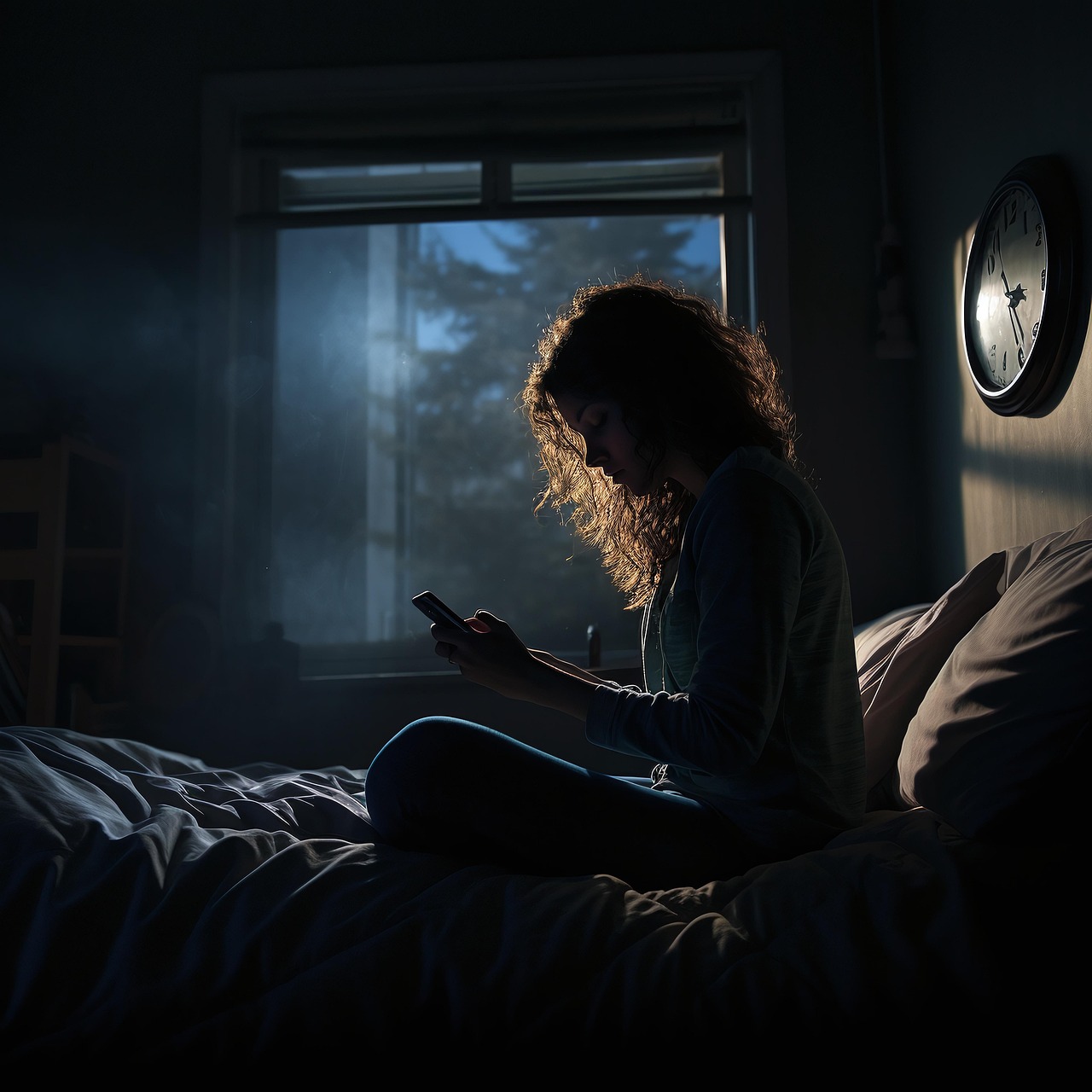Effects of Screen Time on Sleep: The Surprising Impact on Your Rest Quality
Many people find themselves spending more time in front of screens, whether it’s for work, socializing, or entertainment, without realizing the effects of screen time on sleep This increased screen time can negatively affect your sleep quality. Research shows that using screens before bed can lead to difficulties falling asleep and a decline in overall sleep health. .

As you scroll through your devices, the blue light emitted can interfere with melatonin production, a hormone essential for sleep. This means that late-night binge-watching and endless scrolling may leave you feeling restless and tired during the day. Understanding how screen time impacts sleep can help you make better choices about when and how to use your devices.
By creating healthier screen habits, you can improve your sleep and, as a result, your daily life. You’ll find tips on managing screen time and making your bedroom a more sleep-friendly environment.
Key Takeaways
- Screen time can disrupt your natural sleep cycle.
- Managing device use can lead to better sleep quality.
- Practicing healthy habits improves overall sleep health.
Understanding Sleep and Screen Time
Sleep is a vital part of your daily routine. It plays a key role in your health, mood, and energy levels. Screen time can significantly impact how well you sleep and how you feel during the day. Let’s break it down.
Basics of Sleep Cycles
Your sleep happens in cycles, which typically last about 90 minutes. Each cycle includes different stages, such as:
- Light Sleep: You drift in and out of sleep, easily waking up.
- Deep Sleep: This is when your body repairs itself. It’s essential for recovery.
- REM Sleep: Here, you dream, and your brain is very active.
You need all these stages for good sleep quality. Disruptions, especially from screens, can shorten these cycles, leaving you tired. When you consistently lack deep sleep or REM sleep, it can affect your mood, focus, and overall well-being.
Overview of Screen Time
Screen time includes any time spent using devices like phones, tablets, or computers. Engaging with these screens, especially before bed, can reduce your sleep quality. Why?
Blue light emitted by screens can trick your brain into thinking it’s still daytime. This affects your body’s production of melatonin, a hormone that helps regulate sleep. Moreover, the engaging content can keep your mind active, making it hard to wind down.
Research shows that using screens close to bedtime can lead to:
- Longer time to fall asleep
- Fragmented sleep
- Increased fatigue during the day
Managing your screen time, especially in the evening, can help you get better sleep and feel more refreshed.
Impacts on Sleep Quality
Screen time can really mess with how well you sleep. From the blue light that comes from devices to the activities you do right before bedtime, several factors can affect your sleep quality significantly.
Blue Light Exposure and Melatonin
Blue light is everywhere these days, especially from screens. This type of light can trick your brain into thinking it’s still daytime. When you’re exposed to blue light in the evening, it can reduce melatonin production. Melatonin is the hormone that signals your body it’s time to sleep.
Less melatonin means you may find it harder to fall asleep or stay asleep. Research suggests limiting screen time with bright displays in the hour or two before bed can help. Consider using blue light blocking glasses or apps that filter out blue light if you need to use screens in the evening.
Screen Time Before Bedtime
Scrolling through social media or binge-watching shows right before bed might feel relaxing, but it can actually hurt your sleep. Engaging with screens can raise your mental and emotional arousal, making it tough to wind down.
Studies show that people who use screens before bedtime often have poorer sleep quality. The excitement and stimulation from what you watch or read can keep your brain active, delaying sleep onset. Try to switch to calming activities like reading an actual book or listening to soft music instead.
Age-Related Effects
Screen time impacts sleep differently depending on your age. Children and adolescents are especially vulnerable, while adults also face unique challenges. Understanding these differences can help you make better choices about screen use.
Effects on Children and Adolescents
Kids and teens today use screens a lot, especially before bed. Research shows that 90% of studies connect screen time to worse sleep. Watching TV or using devices late at night can delay the release of melatonin, the hormone that helps you sleep.
With screens often present at bedtime, many young people are getting less sleep. This can lead to issues like trouble concentrating in school, mood swings, and increased anxiety. Setting limits on screen time, especially one hour before bed, can help improve sleep health. Encourage kids to read or engage in other relaxing activities instead.
Differences in Adult Sleep Patterns
As you get older, your relationship with screens may change, but the issues are still there. Adults who watch five or more hours of TV daily risk developing serious brain issues, such as dementia and Parkinson’s disease. Screen time, especially at night, messes with sleep quality.
Many adults also experience stress from work or daily life, which can be worsened by late-night screen use. The blue light from screens can delay sleep cycles, making it hard to wake up refreshed. Limiting screen time in the evenings can lead to better sleep and improve your overall health.
Managing Screen Time for Better Sleep
Finding ways to manage your screen time can lead to better sleep and overall health. By making simple changes, you can improve your nightly routine and create a cozy sleep environment.
Adopting a ‘Digital Curfew’
Setting a “digital curfew” means putting away your devices well before bedtime. Aim to stop using screens at least 30 to 60 minutes before you sleep. This helps your body relax and get ready for rest.
You can create a list of activities to do instead, like reading a book, journaling, or listening to calming music.
Consider turning off notifications in the evening. This cuts down on distractions and encourages you to unwind. You can also use apps that remind you when it’s time to put down your devices.
Bedroom Environment Optimization
Your bedroom should be a sleep-friendly space. Start by keeping it dark and cool. Use blackout curtains to block outside light. A cooler room, around 60-67°F, can help you sleep better.
Make sure your bed is comfortable. Invest in a good mattress and pillows that support you.
Minimize noise distractions too. You can use earplugs or a white noise machine to help you sleep. Aromatherapy can be a useful tool. Scents like lavender can promote relaxation.
By optimizing your bedroom environment and setting a digital curfew, you can greatly improve your sleep quality.
The Role of Technology in Sleep Health
Technology plays a significant part in how you manage your sleep. It can help you understand your sleep patterns and offer solutions for better rest. Here are two key areas where technology is making a difference.
Sleep Tracking and Analysis
Sleep tracking devices are becoming popular tools for monitoring your sleep. These gadgets collect data while you sleep, like how long you stay asleep and the quality of your rest.
Many fitness trackers and smartwatches now feature sleep tracking. They typically use sensors to detect movement and heart rate. By analyzing this data, these devices provide insights into your sleep cycles and overall sleep health.
Understanding your sleep patterns helps you identify issues. For instance, if you notice you wake up often, it might be time to change your sleep environment or habits. This awareness can lead to better sleep quality.
Apps for Sleep Improvement
There are several apps designed to enhance your sleep experience. Many focus on relaxation techniques like guided meditation or soothing sounds. These features create a calming environment that can help ease you into sleep.
Some popular apps even personalize content based on your sleep data. For example, if you struggle with falling asleep, an app might suggest calming music or bedtime stories to remedy the effects of screen time on sleep.
Additionally, certain apps offer sleep reminders to help you maintain a consistent bedtime. This consistency is vital for establishing a regular sleep schedule, making it easier for you to drift off when it’s time for bed.
By combining technology with healthy sleep practices, you can create an environment that supports better rest.
Frequently Asked Questions
Many people have questions about screen time and its effects on sleep. Here are some common concerns you might have about how screens can impact your sleep patterns and overall well-being.
Can too much screen time cause sleep problems in kids?
Yes, the effects of screen time on sleep can lead to sleep issues in children. Studies show that using screens for long periods can interfere with sleep schedules and make it harder for kids to fall asleep.
What’s the impact of screen time before bed on sleep quality?
Using screens right before bed can hurt your sleep quality. The blue light emitted by screens tricks your brain into thinking it’s still daytime, making it tougher to wind down and fall asleep.
Does the type of screen content affect how well you sleep?
Yes, the type of content matters. Engaging or violent content can increase your alertness and stress levels, which disrupts sleep. Calm or non-stimulating shows or games might be better options before bed.
How much screen time is considered excessive before bedtime?
Experts suggest limiting screen time to about one hour before bed. If you’re using screens for longer than that, especially close to bedtime, it may be excessive and disrupt your sleep.
Are babies and toddlers at risk of sleep disruption from screen use?
Absolutely. Babies and toddlers can be affected by screen time too. Their sleep patterns can be disrupted when they are exposed to screens, especially in the hour leading up to bedtime.
What symptoms suggest that screen time is negatively affecting sleep?
You might notice signs like difficulty falling asleep, frequent waking during the night, or feeling tired during the day. If you or your child have these symptoms, it could be due to too much screen time.

